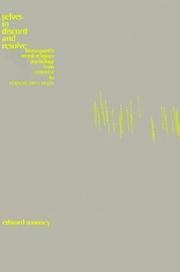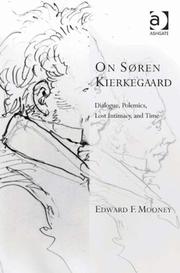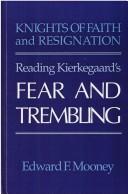| Listing 1 - 10 of 15 | << page >> |
Sort by
|

ISBN: 0415913705 Year: 1996 Publisher: London Routledge
Abstract | Keywords | Export | Availability | Bookmark
 Loading...
Loading...Choose an application
- Reference Manager
- EndNote
- RefWorks (Direct export to RefWorks)
Psychology, Religious --- Self (Philosophy) --- Subjectivity. --- History --- Self (Philosophy). --- Subjectivity --- Subjectivism --- Knowledge, Theory of --- Relativity --- Philosophy --- Psychology of religion --- Religion --- Religions --- Religious psychology --- Psychology and religion --- Psychological aspects --- Psychology --- Kierkegaard, Søren, --- Kierkegaard, Søren --- Anti-climacus --- H. H. --- Kierkegaard, Søren. --- Anti-Climacus, --- Bogbinder, Hilarius, --- Chʻi-kʻo-kuo, --- Climacus, Johannes, --- Constantius, Constantin, --- Eremita, Victor, --- Haufniensis, Vigilius, --- Johannes, Climacus, --- Johannes de Silentio, --- Kʹerkegor, Seren, --- Kierkegaard, S. --- Kierkegaard, Severino, --- Kierkegaard, Søren Aabye, --- K'i︠e︡rkegor, Sʹoren, --- Kīrkajūrd, Sūrīn, --- Kirkegaard, Soeren, --- Kirkegor, Seren, --- Ḳirḳegor, Sern, --- Kirkegors, Sērens, --- Kirukegōru, Søren, --- Kjerkegor, Seren, --- Kʻo-erh-kʻai-ko-erh, --- Notabene, Nicolaus, --- Silentio, Johannes de, --- Sūrīn Kīrkajūrd, --- Victor, Eremita, --- Vigilius, Haufniensis, --- קירקגור, סרן --- קירקגור, סורן --- קירקגור, סירן --- קירקגור, סירן, --- קירקגורד, סרן, --- 克尓凯郭尓,

ISBN: 9786611958725 1281958727 0253000432 9780253000439 9780253351418 0253351413 9780253219954 0253219957 661195872X 9781281958723 Year: 2008 Publisher: Bloomington, Ind. Indiana University Press
Abstract | Keywords | Export | Availability | Bookmark
 Loading...
Loading...Choose an application
- Reference Manager
- EndNote
- RefWorks (Direct export to RefWorks)
This volume collects essays from 13 leading scholars that center on key themes that characterize Kierkegaard's philosophy of religion.
Kierkegaard, Soren, --- Kierkegaard, Søren --- Anti-climacus --- H. H. --- Kierkegaard, Søren, --- Anti-Climacus, --- Bogbinder, Hilarius, --- Chʻi-kʻo-kuo, --- Climacus, Johannes, --- Constantius, Constantin, --- Eremita, Victor, --- Haufniensis, Vigilius, --- Johannes, Climacus, --- Johannes de Silentio, --- Kʹerkegor, Seren, --- Kierkegaard, S. --- Kierkegaard, Severino, --- Kierkegaard, Søren Aabye, --- K'i︠e︡rkegor, Sʹoren, --- Kīrkajūrd, Sūrīn, --- Kirkegaard, Soeren, --- Kirkegor, Seren, --- Ḳirḳegor, Sern, --- Kirkegors, Sērens, --- Kirukegōru, Søren, --- Kjerkegor, Seren, --- Kʻo-erh-kʻai-ko-erh, --- Notabene, Nicolaus, --- Silentio, Johannes de, --- Sūrīn Kīrkajūrd, --- Victor, Eremita, --- Vigilius, Haufniensis, --- קירקגור, סרן --- קירקגור, סורן --- קירקגור, סירן --- קירקגור, סירן, --- קירקגורד, סרן, --- 克尓凯郭尓, --- Kierkegaard, Sren,

ISBN: 1315247674 135191376X 1281099503 075468735X 9786611099503 9781351913768 9780754687351 9781281099501 9780754658207 0754658201 9780754658221 0754658228 9781315247670 9781351913744 Year: 2007 Publisher: Aldershot Ashgate
Abstract | Keywords | Export | Availability | Bookmark
 Loading...
Loading...Choose an application
- Reference Manager
- EndNote
- RefWorks (Direct export to RefWorks)
Tracing a path through Kierkegaard's writings, this book brings the reader into close contact with the texts and purposes of this remarkable 19th century Danish writer and thinker. Kierkegaard writes in a number of voices and registers: as a sharp observer and critic of Danish culture, or as a moral psychologist, and as a writer concerned to evoke the religious way of life of Socrates, Abraham, or a Christian exemplar.In developing these themes, Mooney sketches Kierkegaard's Socratic vocation, gives a close reading of several central texts, and traces 'The Ethical Sublime' as a recurrent theme
Philosophy. --- Mental philosophy --- Humanities --- Kierkegaard, Søren, --- Kierkegaard, Søren --- Anti-climacus --- H. H. --- Kierkegaard, Søren. --- Anti-Climacus, --- Bogbinder, Hilarius, --- Chʻi-kʻo-kuo, --- Climacus, Johannes, --- Constantius, Constantin, --- Eremita, Victor, --- Haufniensis, Vigilius, --- Johannes, Climacus, --- Johannes de Silentio, --- Kʹerkegor, Seren, --- Kierkegaard, S. --- Kierkegaard, Severino, --- Kierkegaard, Søren Aabye, --- K'i︠e︡rkegor, Sʹoren, --- Kīrkajūrd, Sūrīn, --- Kirkegaard, Soeren, --- Kirkegor, Seren, --- Ḳirḳegor, Sern, --- Kirkegors, Sērens, --- Kirukegōru, Søren, --- Kjerkegor, Seren, --- Kʻo-erh-kʻai-ko-erh, --- Notabene, Nicolaus, --- Silentio, Johannes de, --- Sūrīn Kīrkajūrd, --- Victor, Eremita, --- Vigilius, Haufniensis, --- קירקגור, סרן --- קירקגור, סורן --- קירקגור, סירן --- קירקגור, סירן, --- קירקגורד, סרן, --- 克尓凯郭尓, --- Kierkegaard, Sren,
Book
ISBN: 1283874148 1441128824 9781441128829 9781441190345 1441190341 9781441146328 1441146326 Year: 2012 Publisher: New York Continuum
Abstract | Keywords | Export | Availability | Bookmark
 Loading...
Loading...Choose an application
- Reference Manager
- EndNote
- RefWorks (Direct export to RefWorks)
Noted Kierkegaard scholar Edward Mooney guides the reader through the major themes of the Danish philosopher's life and thought. Each chapter frames a striking issue, usually encapsulated in a short passage from Kierkegaard, and pursues it directly and deeply. Kierkegaard speaks to our need for self-understanding, our need to negotiate the tensions between surprisingly subtle capacities for communication and surprisingly easy descent into clichés and banality. The chapter of this book follow and re-animate Kierkegaard's brilliant and humorous discussions of death and authenticity, of the mater
Faith --- Religious belief --- Theological belief --- Belief and doubt --- Religion --- Salvation --- Theological virtues --- Trust in God --- Philosophy. --- Kierkegaard, Søren, --- Kierkegaard, Søren --- Anti-climacus --- H. H. --- Kierkegaard, Søren. --- Anti-Climacus, --- Bogbinder, Hilarius, --- Chʻi-kʻo-kuo, --- Climacus, Johannes, --- Constantius, Constantin, --- Eremita, Victor, --- Haufniensis, Vigilius, --- Johannes, Climacus, --- Johannes de Silentio, --- Kʹerkegor, Seren, --- Kierkegaard, S. --- Kierkegaard, Severino, --- Kierkegaard, Søren Aabye, --- K'i︠e︡rkegor, Sʹoren, --- Kīrkajūrd, Sūrīn, --- Kirkegaard, Soeren, --- Kirkegor, Seren, --- Ḳirḳegor, Sern, --- Kirkegors, Sērens, --- Kirukegōru, Søren, --- Kjerkegor, Seren, --- Kʻo-erh-kʻai-ko-erh, --- Notabene, Nicolaus, --- Silentio, Johannes de, --- Sūrīn Kīrkajūrd, --- Victor, Eremita, --- Vigilius, Haufniensis, --- קירקגור, סרן --- קירקגור, סורן --- קירקגור, סירן --- קירקגור, סירן, --- קירקגורד, סרן, --- 克尓凯郭尓, --- Kierkegaard, Sren,

ISBN: 0791405729 Year: 1991 Publisher: Albany State university of New York press
Abstract | Keywords | Export | Availability | Bookmark
 Loading...
Loading...Choose an application
- Reference Manager
- EndNote
- RefWorks (Direct export to RefWorks)
Book
ISBN: 1501305689 1501305670 9781501305672 9781501305665 1501305662 9781501305689 9781501305658 1501305654 9781501305641 1501305646 Year: 2015 Publisher: New York
Abstract | Keywords | Export | Availability | Bookmark
 Loading...
Loading...Choose an application
- Reference Manager
- EndNote
- RefWorks (Direct export to RefWorks)
"Excursions with Thoreau is a major new exploration of Thoreau's writing and thought that is philosophical yet sensitive to the literary and religious. Edward F. Mooney's excursions through passages from Walden, Cape Cod, and his late essay "Walking" reveal Thoreau as a miraculous writer, artist, and religious adept. Of course Thoreau remains the familiar political activist and environmental philosopher, but in these fifteen excursions we discover new terrain. Among the notable themes that emerge are Thoreau's grappling with underlying affliction; his pursuit of wonder as ameliorating affliction; his use of the enigmatic image of "a child of the mist"; his exalting "sympathy with intelligence" over plain knowledge; and his preferring "befitting reverie"-not argument-as the way to be carried to better, cleaner perceptions of reality. Mooney's aim is bring alive Thoreau's moments of reverie and insight, and to frame his philosophy as poetic and episodic rather than discursive and systematic."--Bloomsbury Publishing. "A literary and philosophical exploration of Thoreau as a prose-poet and religious adept who carries us into fresh and unexpected communion with landscape, seascape, open sky, and what he calls "the unfathomable."--Bloomsbury Publishing.
Insight. --- Nature in literature. --- Poetry --- Religion in literature. --- Suffering in literature. --- Influence. --- Thoreau, Henry David, --- Philosophy.
Book
ISBN: 9781501357718 Year: 2020 Publisher: London Bloomsbury Academic
Abstract | Keywords | Export | Availability | Bookmark
 Loading...
Loading...Choose an application
- Reference Manager
- EndNote
- RefWorks (Direct export to RefWorks)
Book
ISBN: 1282268473 9786612268472 0191550248 9780191550249 6612268476 9780199214198 0199214190 9781282268470 Year: 2009 Publisher: Oxford Oxford University Press
Abstract | Keywords | Export | Availability | Bookmark
 Loading...
Loading...Choose an application
- Reference Manager
- EndNote
- RefWorks (Direct export to RefWorks)
These two complementary works give the reader a unique insight into the breadth and substance of Kierkegaard's thought. One reads like a novel and the other a Platonic dialogue but both concern the nature of love, faith, and happiness. These are the first translations to convey the literary quality and philosophical precision of the originals. - ;'The love of repetition is in truth the only happy love'So says Constantine Constantius on the first page of Kierkegaard's Repetition. Life itself, according to Kierkegaard's pseudonymous narrator, is a repetition, and in the course of this witty, pla
Love --- Time --- Identity (Philosophical concept) --- Christianity --- Repetition (Philosophy) --- Philosophy --- Identity --- Comparison (Philosophy) --- Resemblance (Philosophy) --- Philosophy.
Digital
Year: 2009 Publisher: Oxford Oxford University Press
Abstract | Keywords | Export | Availability | Bookmark
 Loading...
Loading...Choose an application
- Reference Manager
- EndNote
- RefWorks (Direct export to RefWorks)
Philosophy --- Philosophy of nature --- Developmental psychology --- Religious studies
Book

ISBN: 9780823265022 Year: 2015 Publisher: New York, NY
Abstract | Keywords | Export | Availability | Bookmark
 Loading...
Loading...Choose an application
- Reference Manager
- EndNote
- RefWorks (Direct export to RefWorks)
| Listing 1 - 10 of 15 | << page >> |
Sort by
|

 Search
Search Feedback
Feedback About UniCat
About UniCat  Help
Help News
News